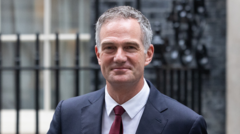How Are UK Turing AI Institute Leaders Addressing Staff Outrage?

Understanding the Challenges Facing the UK's National Institute for Artificial Intelligence
In recent months, the UK's national institute for artificial intelligence (AI), known as the Turing Institute, has been navigating a turbulent landscape marked by significant organizational changes and internal strife. This article will delve into the complexities of the situation, examining the concerns raised by whistleblowers, the institute's response, and the potential implications for the future of AI research and development in the UK.
The Current Climate at the Turing Institute
Staff at the Turing Institute have expressed that the past few months have been particularly challenging, with escalating concerns about the organization's direction and management. The institute, which is largely funded by the government to the tune of £100 million, is under pressure to prioritize its focus on defense-related AI applications. This shift has been directed by Technology Secretary Peter Kyle, who has indicated that funding could be jeopardized if the institute does not comply.
Whistleblower Concerns
In a recent whistleblowing complaint submitted to the Charity Commission, employees outlined "serious and escalating concerns" regarding the Turing Institute's operational integrity. They warned that the organization is at risk of collapse, a statement that underscores the severity of the situation. Whistleblowers have described the management's approach to these issues as "performative," suggesting that their responses lack substance and fail to address the root problems within the organization.
Management's Response to Criticism
Dr. Doug Gurr, the Chair of the Turing Institute, acknowledged the challenges in a letter to staff, stating that the institute would "step up at a time of national need." He indicated the establishment of a new senior working group, which includes both government officials and Turing Institute staff, to address these pressing issues. However, whistleblowers have criticized this initiative as insufficient, claiming that it has led to "just talk" without any meaningful action.
The Culture of Retaliation and Defensiveness
One of the most troubling aspects of the whistleblowers' complaints is the alleged toxic internal culture at the Turing Institute. Accusations of "retaliation" and "defensiveness" have been leveled against the management, with several employees expressing fear of repercussions for speaking out. Dr. Gurr and Chief Executive Dr. Jean Innes have not directly addressed these accusations, raising questions about the leadership's commitment to fostering a culture of openness and accountability.
Calls for Leadership Overhaul
Both whistleblowers and Peter Kyle have called for an overhaul of the leadership team at the Turing Institute. However, despite these calls for change, there has been no indication that any management personnel will be replaced. This lack of action may further exacerbate employee dissatisfaction and distrust within the organization.
Implications for AI Research and Development
The current turmoil within the Turing Institute could have significant implications for AI research and development in the UK. As a leading institution in this field, its ability to operate effectively is crucial not only for national interests but also for the global AI landscape. The ongoing restructuring process, which has already led to the departure of several senior staff members, raises concerns about the retention of talent and expertise.
Impact on Funding and Future Projects
With the government mandating a shift towards defense-related projects, the Turing Institute faces the dual challenge of maintaining its core research functions while also adapting to new priorities. The potential withdrawal of funding by the government could further destabilize the organization, making it difficult to attract and retain top-tier researchers and developers.
The Importance of Transparency
For the Turing Institute to regain the trust of its employees and stakeholders, a commitment to transparency is essential. The assertions made by whistleblowers highlight the need for a more open dialogue between management and staff. Implementing robust whistleblowing guidelines, as mentioned by Dr. Gurr, is a step in the right direction, but it must be coupled with genuine action to address the underlying issues.
Fostering a Positive Work Environment
Creating a positive work environment is crucial for the Turing Institute’s long-term success. Initiatives aimed at improving workplace culture, such as regular feedback sessions, team-building activities, and support for mental health, can contribute to a more engaged and motivated workforce. Leadership must prioritize these aspects to cultivate a sense of belonging and purpose among employees.
Conclusion: The Path Forward for the Turing Institute
The Turing Institute stands at a critical juncture as it navigates through substantial changes and internal challenges. The organization's ability to adapt to new demands while addressing the concerns of its staff will be pivotal in shaping its future. As the landscape of AI continues to evolve, the Turing Institute must remain committed to innovation, integrity, and transparency to maintain its position as a leader in the field.
As we reflect on the current situation, one must ponder: What steps can be taken to ensure that organizations like the Turing Institute can thrive amidst change and maintain their commitment to research and development? The answers may lie in fostering a culture of dialogue and accountability.
FAQs
What is the Turing Institute's main focus?
The Turing Institute primarily focuses on advancing artificial intelligence research and its applications across various sectors, including healthcare, finance, and national security.
Why are staff raising concerns about the Turing Institute?
Staff have raised concerns due to perceived mismanagement, a toxic workplace culture, and the recent shift in priorities towards defense-related AI applications, which they believe could jeopardize the institute's integrity and mission.
What are the implications of the government's funding decisions?
The government's funding decisions could significantly impact the Turing Institute's research capabilities and its ability to attract and retain talent, ultimately affecting the UK’s position in the global AI landscape.
As the Turing Institute grapples with these challenges, the question remains: How can organizations balance the demands of government priorities while fostering innovation and a supportive work culture? #ArtificialIntelligence #TuringInstitute #WorkCulture
Published: 2025-08-15 12:00:16 | Category: technology



